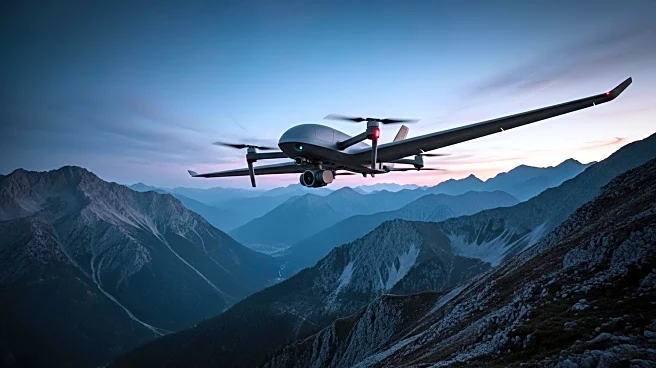What is the story about?
What's Happening?
NATO has initiated a new operation named 'Eastern Sentry' following recent Russian drone incursions into Polish airspace. The operation was announced by NATO Secretary-General Mark Rutte after 19 drones crossed into Poland during a Russian attack on Ukraine. Poland responded by invoking NATO's Article 4, leading to the deployment of NATO forces to bolster defense against further drone violations. The operation involves contributions from Denmark, France, and Germany, with Denmark providing F-16 fighters and an anti-air warfare frigate, France contributing Rafale jets, and Germany deploying Eurofighter aircraft. The operation is managed by NATO's Allied Command Operations and is modeled after the Baltic Sentry operation, aiming to enhance security along NATO's eastern borders.
Why It's Important?
The 'Eastern Sentry' operation underscores NATO's commitment to defending its member states against external threats, particularly from Russian military activities. The incursions into Polish airspace highlight ongoing tensions between Russia and NATO, with potential implications for regional security and international relations. The operation aims to deter further drone violations and strengthen NATO's defensive posture, which is crucial for maintaining stability in Eastern Europe. The involvement of multiple NATO countries in the operation reflects a unified response to perceived aggression, potentially influencing future diplomatic and military strategies in the region.
What's Next?
As 'Eastern Sentry' progresses, NATO will continue to monitor and respond to drone incursions, potentially expanding the operation's scope if violations persist. The alliance may also explore new technologies for counter-drone measures, enhancing its capabilities to detect and neutralize threats. Diplomatic discussions between NATO and Russia could arise, focusing on de-escalation and preventing further incidents. The operation's outcomes may influence NATO's strategic planning and defense policies, particularly regarding its eastern borders and relations with Russia.
Beyond the Headlines
The operation raises questions about the broader implications of drone warfare and its impact on international security dynamics. The use of drones by Russia to test NATO's defenses could signal a shift in military tactics, prompting NATO to adapt its strategies accordingly. The situation also highlights the importance of technological advancements in defense systems, as NATO seeks to develop effective countermeasures against drone threats. Additionally, the operation may affect NATO's internal cohesion, as member states collaborate to address shared security challenges.















